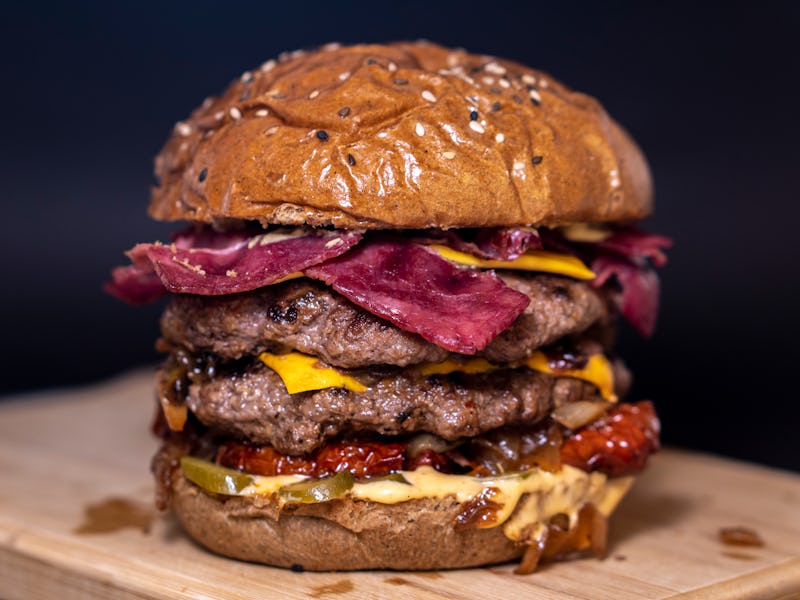Why Chef Roy Choi Needs You to Stop Posting Hamburgers on Instagram
"A burger somehow makes them forget about everything that they care about."

To the Instagram generation, a dripping, double-stacked hamburger glistening with cheese and grease is an irresistible thing. Under the hashtag #FoodPorn, beef is a fetish, a substitute for sex.
Chef Roy Choi, celebrated founder of the gourmet food truck movement, is well-aware: He built his legacy on the short rib taco at Kogi, which is plump with fatty, charred chunks of beer. But that was in a different life.
Choi host of the new six-part documentary series Broken Bread, it’s time to put down the beef.
"But nothing will ever stop them from posting a food porn picture of a smashed cheeseburger."
Choi is not a vegetarian, but his new show about the champions of the socially conscious food movement has made it impossible for him to ignore the impact of beef on our planet. Climate scientists have made it clear that industrial cattle farms clear out huge tracts of forested land that are home to countless trees and at-risk species, and the cows release immense amounts of planet-warming methane. According to NASA, 2018 was the fourth-hottest year ever recorded on this planet, and it shows in our declining wildlife, poor mental health, and rising waters.
Chef Roy Choi rose to fame with his gourmet food truck Kogi, famous for its short rib tacos. Now he's asking us to question our obsession with beef.
Choi is rightfully concerned about our consumption of meat, but instead of going head to head with Big Beef, he’s tackling the problem from a different front — the one pointing the camera lens at the burger.
“It’s a really odd situation where you have very smart people and very conscious people still putting up hamburger posts of In-N-Out,” Choi, a Los Angeles native, tells Inverse.
“These are bloggers and media companies that I know are extremely conscious and cognizant of what they try to represent. But nothing will ever stop them from posting a food porn picture of a smashed cheeseburger.”
Why Can’t We Help Posting Burger Photos?
Under the hashtag #foodporn on Instagram, burgers dominate the space.
What is it about a juicy burger that overrides the beliefs of even the most socially and environmentally conscious consumer, pressing their thumbs toward the “post” button even if they’re aware of what it symbolizes? Perhaps it is, as the #FoodPorn trend suggests, the glamor of what’s forbidden, delicious, and excessive. It could be that posting photos of burgers is a boast, an assertion that one can eat whatever they want, health and planet be damned.
Whatever the explanation, in asking this difficult question, Choi forces foodies to confront some uncomfortable self-truths.
“Even to the new generation that are so woke and conscious, it’s still a burger that somehow makes them forget about everything that they care about.”
Choi is aware it won’t be easy, or fun, to switch to the “planetary health” diet — mostly plants, less meat, and less food in general — that World Health Organization scientists say is best for the Earth. But he’s aware that something has to change, and he’s actively thinking of ways to bridge the gap between our present and future diet.
“The future really lies in how do we move toward a more plant-based diet or figure out how we reduce our portion size?”
Getting Over Our Burger Fetish
To a person who’s just posted a photo of a towering Shake Stack to Instagram and then devoured it, the prospect of switching to a plant-based diet can seem like a huge leap. Perhaps it is, nutritionally, but maybe it doesn’t have to feel like it psychologically.
"If we keep posting pictures of our dripping double-double in our hand, there is going to be a cliff."
In the episode “Future,” Choi profiles the creators of Beyond Meat, a plant-based meat company whose products are tasty enough to be on the menus at TGI Friday’s and Bareburger; its major competitor, Impossible Foods, has just launched plant-based Whoppers at Burger King locations across the United States. Plant-based burgers aren’t quite at the point where “we can take it to a tailgate in Buffalo,” Choi says, but they’re “delicious” nonetheless.
Eventually, he hopes, we can learn to fetishize a plant-based burger as much as a beef-based one. But being self-aware in the moment when our hamburgers turn into online content might be the first step.
“I wanted to show in this episode not that you have to stop caring about burgers, but maybe you have to stop caring about them a little bit,” he says.
“If we keep posting pictures of our dripping double-double in our hand, there is going to be a cliff.”
The broadcast premiere of Broken Bread is May 15 at 8:30 PM on Tastemade TV and PBS channel KCET.